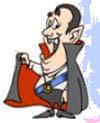|
HOME
Home page
with latest updates |
NEWS
Links
to festivals, exhibitions,
museums, concerts, theatres...
|
COUNTRIES
Round
the world : English-speaking
countries
PHOTO
GALLERY
Various
topics
|
RESOURCE
teacher's
resource,
press,
grammar, cinema...
FUNCORNER
Games,
audio, quizzes
|
TRAVELS
Sightseeing
: what you want to know
before you leave |
LINKS
Useful
classified links |
|
email
|


Origins
Selection of
links
ORIGINS
of HALLOWE'EN
About 2,000 years ago the Celts
lived in what is now Ireland,
the United Kingdom, and northern
France. They considered the
end of the year to be the end
of the harvest (1)
season. So,
they celebrated new year's eve
(2) each
year on October 31st with a
festival called "Samhain,"
named after their Lord of the
Dead (3)
(also known
as the Lord of Darkness). Druids
(Celtic priests) presided over
Samhain (pronounced 'sow-in').
Winter was associated with human
death (4).
The Celts believed that the
boundary (5)
between the
worlds of the living and the
dead mixed : ghosts (6)
of the dead
to return to earth (7).
Celts thought that the presence
of the ghosts made it easier
for the Druids to predict the
future. These predictions were
an important source of comfort
and direction for the Celts
during their long, dark, frightening
winters.
To celebrate Samhain, the Druids
built big sacred bonfires (8)
: the Celts
burnt crops (9)
and animals
as sacrifices to their ancient
gods (10).
During the celebration, the
Celts dressed up in costumes
consisting of animal heads and
skins (11)
and tried to tell each
other's fortunes.
Later the Celts were conquered
by the Romans, and about 43
AD (12)
two Roman festivals
were combined with the Celtic
Samhain festival.
By 800 AD, the influence of
Christianity spread into Celtic
lands. Pope (13)
Boniface IV
designated November 1st as All
Saints' Day (14),
a time to honour saints and
martyrs. The celebration was
also called "All-hallows"
or "All-hallowmas"
and the night before it, the
night of Samhain, began to be
called "All-hallows Eve"
and, finally, "Halloween".
VOCABULARY
NOTES
(1) harvest - récolte
(2) new year's eve - la veille
du jour de l'an
(3) the dead - les morts
(4) death - la mort
(5) boundary - frontière,
limite
(6) ghost - fantôme
(7) earth - la terre
(8) bonfire - feu (de joie)
(9) crop - culture, récolte
(10) god - dieu
(11) animal heads and skins
- têtes et peaux de bête
(12) AD - Anno Domini, après
Jésus Christ
(13) Pope - le Pape
(14) All Saints' Day - la Toussaint
SELECTION
of LINKS
 resource ac-nancy-metz.fr
resource ac-nancy-metz.fr
 colouring pages kidsturncentral.com
colouring pages kidsturncentral.com
 pumpkin
jigsaw puzzle primarygames.com
pumpkin
jigsaw puzzle primarygames.com
 fall jigsaw
puzzle
primarygames.com
fall jigsaw
puzzle
primarygames.com
 vocabulary and test
xtec.es
vocabulary and test
xtec.es
 cliparts
hellasmultimedia.com
cliparts
hellasmultimedia.com
 cliparts
cliparts
 history
historychannel.com
history
historychannel.com
 recipes, traditions, songs...
jackolanterns.net
recipes, traditions, songs...
jackolanterns.net
 worksheets (.pdf) p6.hostingprod.com
worksheets (.pdf) p6.hostingprod.com
 interactive Alfy's story alfy.com
interactive Alfy's story alfy.com
 worksheets (.pdf) langedizioni.com
worksheets (.pdf) langedizioni.com
 virtual haunted house with narration
virtual haunted house with narration
 FAQ woodlands-junior.kent.sch.uk
FAQ woodlands-junior.kent.sch.uk
|